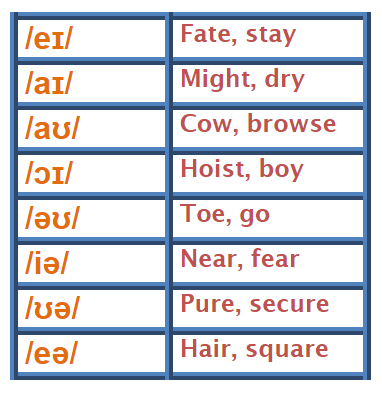


The word “no” on the other hand, is a diphthong /oʊ/ (“oh”) spelled with only one vowel. The key to the diphthong definition is whether your tongue moves to produce the sound. The examples above are actually monophthongs. Sure they have two vowels together, but they’re not diphthongs. There are words in English that are spelled with two vowels together that are not diphthongs. So how do you identify diphthongs? Not based on spelling. You may be thinking, “Wait, there are only five vowels in English.” That’s true for spelling, but when it comes to pronunciation in American English, there are 20 unique vowel sounds: 12 vowel monophthongs and five (or eight) vowel diphthongs. The root words in ancient Greek mean “two sounds.”ĭiphthongs are complex vowels in contrast to monophthongs – single or simple vowel sounds that don’t make your tongue move. That’s why diphthongs are also known as gliding vowels.

A diphthong is a combination of two vowel sounds where the pronunciation moves from one vowel to the other.


 0 kommentar(er)
0 kommentar(er)
